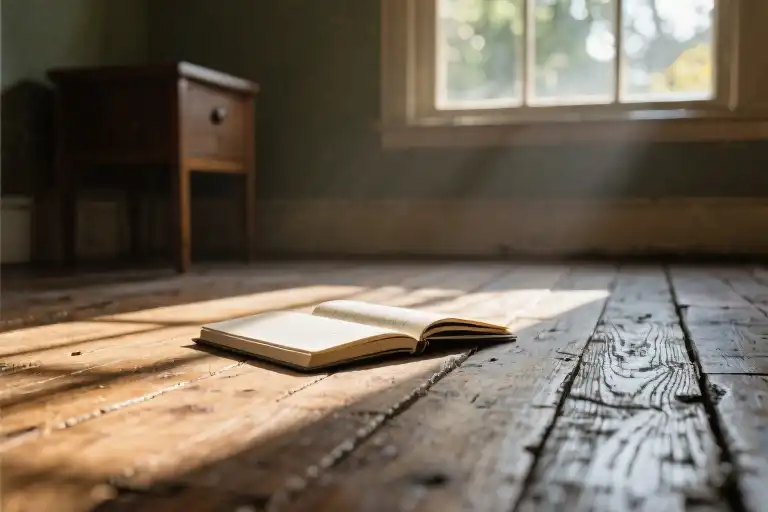No brand. No confidence. No bed. Just two small bodies curled next to mine on hardwood floors that never warmed, no matter how many layers of clothing we piled beneath us. A voice so choked with shame it came out in whispers when social workers asked questions. No followers, unless you counted the caseworker who visited Thursdays. No experience beyond surviving. No hope except the stubborn kind that lingers in your ribs like a second heartbeat you’re ashamed to admit still exists.
I wrote anyway. Not from courage or vision, but because my fingers moving across the keyboard made slightly less noise than sobbing, and the neighbors had stopped knocking to check on us. The words weren’t good. They weren’t even honest at first—just descriptions of the weather, grocery lists, anything to avoid writing what really filled my head. But they existed. And that mattered more than I understood then.
If you’re reading this with your back against some invisible wall, convinced your broken parts disqualify you from rebuilding, let me say this plainly: You’re dead wrong. Not in the empty ‘believe in yourself’ way that glosses over rent payments and trauma triggers, but in the bone-deep way of someone who’s washed dishes with water boiled in a coffee maker because the gas got shut off again. What you have right now, in this moment, is the exact raw material I used to claw my way toward light.
Three years ago, I became a domestic violence survivor in the clinical sense when I left with two trash bags of belongings, my kids, and a terrified husky pressed against my legs in the Uber. The freedom we’d risked everything for tasted like stale crackers and the metallic fear of knowing we were hiding less than 3 miles from where he still kept his golf clubs. Relief didn’t come in some cinematic wave—just quiet stretches between panic attacks in the cereal aisle, the way my daughter’s shoulders slowly unclenched after six Thursdays without screaming.
This isn’t a story about abuse. It’s about what comes after the leaving, when you’re technically safe but the bathroom mirror still makes you flinch. About how ‘starting over’ looks nothing like the montages in movies—more like teaching ESL online at 3am while your kids sleep in a closet-turned-bedroom, your paychecks measured in increments of $12.73 after platform fees. Most of all, it’s proof that rebuilding isn’t about the grandeur of your beginnings, but the stubbornness of your continuings.
What I didn’t know then, what you might not see yet: That floor we slept on became an altar. Those whispered words grew calluses and then wings. The exact things that feel like evidence of your inadequacy—the instability, the fear, the rawness—are the very things that will make your voice matter when it finally finds its volume.
The Floor Is Your Foundation
The police called it freedom when they helped us load the last garbage bag of belongings into the car. But freedom smelled like stale motel sheets and sounded like my toddler asking for the third time why we couldn’t go home. For seventeen nights, we slept on a floor so thin I could hear the ice machine humming through the walls – a sound that still tightens my shoulders when I pass convenience stores.
What nobody tells you about escaping domestic violence is how loud silence becomes. No more yelling, no more objects smashing against walls, just the relentless tick of a dollar store clock counting down the minutes until rent was due. I’d sit cross-legged on that scratchy carpet grading student essays by the glow of my laptop, the blue light mixing with the orange streetlights bleeding through the curtains. The quiet was almost worse than the chaos.
Grocery stores became minefields. I’d clutch my shopping list like a lifeline, focusing on the items – store brand cereal, powdered milk, the cheapest apples – because looking up meant seeing normal families. The woman in the organic produce section laughing with her husband as their toddler sat comfortably in the cart. That’s when my hands would start shaking, not from fear but from the unbearable weight of everything I’d never have. The cashier would ask if I needed help out, and I’d lie that my car was just outside, praying the kids wouldn’t mention we walked three blocks in the rain.
Three Truths That Floor Taught Me
- Stop measuring in before-and-after
The self-help books talked about ‘rebuilding’ as if life was Lego – just reassemble the pieces differently. But some pieces were gone forever. My teaching certificate still had my married name. The family photos I’d left behind were probably already in the trash. Acceptance began when I stopped trying to recreate what was and started inventorying what remained: two healthy kids, a working laptop, and the ability to type 80 words per minute. - Let your body lead
Therapy wasn’t an option on $12/hour, but I discovered my knees knew what my mind refused to acknowledge. When the panic started rising in the cereal aisle, I’d press my palms flat against the freezer door until the cold burned. The physical sensation grounded me better than any breathing exercise. Your body keeps score, but it also keeps solutions – if you’re willing to listen to its crude language of hunger tremors and exhausted eyelids. - Make friends with your rock bottom
That floor became my altar. Not in a poetic way – I mean literally tracing the wood grain with my finger while the kids slept, memorizing every knot and splinter. When you stop fighting the reality of your circumstances, they lose power over you. I started noticing things: how the morning light hit that particular floorboard first, how the downstairs neighbor’s cat would scratch at our door at 3pm like clockwork. These tiny anchors made the days bearable.
What looks like nothing from the outside – a woman sitting on the floor, a half-empty notebook, a single lightbulb swinging from the ceiling – can be the birthplace of everything. My life didn’t start getting better when I found hope. It started changing when I stopped waiting for hope to arrive and began working with what I had. That floor held us up long enough for me to learn the most important lesson: foundations don’t have to be pretty to be solid.
Writing With Broken Hands
The cursor blinked on an empty screen. My fingers hovered over the keyboard, trembling not from fear but from exhaustion. Two children slept fitfully on the floor behind me, their breathing uneven like my thoughts. That night, I wrote 87 words about the texture of instant ramen noodles. Not a manifesto. Not a viral thread. Just noodles.
This became my 5% rule: When you can’t fathom doing 100% of something, do what’s 5% possible. For me, writing about noodles was 5%. For you, it might be recording a 30-second voice memo about your day, or texting one friend a sentence you’re proud of. These fragments matter more than we think.
The Alchemy of Small Actions
Three things happened when I committed to my 5%:
- The archive grew – Those unremarkable snippets (now saved in a folder called ‘Noodle Days’) became proof I could create even when broken
- Muscle memory developed – Writing 50 words daily rewired my brain to spot micro-stories everywhere: the way sunlight hit my daughter’s mismatched socks, the rhythm of my dog’s paws on hardwood floors
- Invisible bridges formed – One ramen paragraph accidentally contained a metaphor about resilience that later became the core of my first paid essay
Your Micro-Action Toolkit
Try one of these tonight instead of planning grand projects:
- The receipt method – Jot observations on any scrap paper (grocery receipts work beautifully)
- Shower storytelling – Dictate ideas into your phone’s voice notes while doing mundane tasks
- The two-sentence rule – Before bed, write one true sentence about today and one hopeful one for tomorrow
A year after those noodle writings, I found myself teaching a virtual workshop about finding your voice. A participant asked, ‘How did you know you were ready to share your writing?’ I showed her my ‘Noodle Days’ folder. ‘This,’ I said, ‘was my readiness.’
What’s your 5% today? Not your dream. Not your masterpiece. Just the next few words waiting to be born.
Turning Words Into Bread
The first time I received payment for teaching online, it wasn’t much—$27 for a 45-minute grammar lesson. But that direct deposit notification felt like oxygen returning to my lungs after years of holding my breath. When you’re rebuilding from nothing, income isn’t just currency; it’s concrete proof you’re capable of creating value.
The Myth of ‘Ready’
I used to believe I needed certifications, a home office, or polished video equipment before offering my skills. Then survival taught me this truth: People pay for solutions, not credentials. That $27 came from a parent who simply needed someone patient to explain English articles (‘a’ vs. ‘the’) to their struggling middle-schooler. My qualification? Having successfully raised two bilingual kids while sleeping on floors.
Platform Reality Check
After testing 12 online teaching/earning platforms, patterns emerged:
- Preply/TutorMe (Language Teaching)
- Earnings: $10-$25/hour starting (higher for niche subjects)
- Time Sink: 30% profile setup, 20% unpaid trial lessons
- Hidden Perk: Built-in scheduling prevents client ghosting
- Rev/TranscribeMe (Transcription)
- Earnings: $0.30-$1.10 per audio minute
- Time Sink: 4-6x audio length when starting
- Game Changer: Work at 2AM while kids sleep
- Fiverr/Upwork (Freelance Writing)
- Earnings: $5-$50 per piece (initially)
- Time Sink: Bidding wars consume morale
- Pro Tip: Package services (“3 blog posts + SEO tips” outperforms solo gigs)
The sweet spot? Combining platforms. Mornings on Preply for guaranteed income, nights on Rev when mental energy wanes, weekends building Fiverr portfolio pieces.
The 1-Hour Monetization Sprint
Here’s the exact sequence I used to generate my first $100:
- Minimal Viable Profile (15 mins)
- Single professional-ish photo (I used a library computer)
- 3-sentence bio focusing on client pain points (“Struggling with English essays? Let’s fix your thesis statements.”)
- One 90-second intro video recorded on a borrowed phone
- Micro-Offer Launch (20 mins)
- Created single affordable service ($5 ‘Paragraph Repair’ on Fiverr)
- Posted in 3 Facebook groups for parents of ESL students
- The Snowball Tactic (25 mins)
- Messaged first 5 clients post-service: “Would you need [specific related help]?”
- Upsold 2 into $15 ‘Essay Emergency’ sessions
This isn’t scalable wealth—it’s survival alchemy. Turning scraps of time and skill into grocery money builds the muscle for bigger opportunities.
Case Study: Maria’s Transcription Lifeline
Maria (name changed), a reader from Texas, shared how she adapted this approach:
- Day 1: Signed up for Rev using library Wi-Fi during kids’ dental appointment
- Week 1: Averaged $3/hour transcribing medical files (“Those Latin terms nearly broke me”)
- Month 3: Landed steady work transcribing therapy sessions ($1.20/minute)
- Now: Trains other survivors through a nonprofit, charging $15/hour
Her breakthrough came from treating early earnings as tuition: “That $27 I spent on a used keyboard? Best investment since diapers.”
The Real Currency
What no platform dashboard shows: Every dollar earned through your own skills—no matter how small—reconfigures your self-perception. You stop being ‘someone who needs help’ and become ‘someone who solves problems.’ That shift, more than any payment, is the real bread your words can bake.
Rebuilding the Mirror
The floor where I slept with my kids wasn’t just a surface—it was a mirror. Not the kind that shows your reflection, but the brutal kind that strips away every lie you’ve told yourself. When you’re pressed against hardwood with two children curled into your ribs, you stop asking “Why me?” and start asking “What now?” That shift changes everything.
The Archaeology of Survival
We spend years digging through other people’s definitions of success while ignoring the tools in our own hands. Here’s how to excavate your hidden strengths:
- The Receipt Test – Go through your last 10 transactions (even if they’re just $3 coffee purchases). What problems were you solving? Maybe that “wasteful” latte was actually fuel for keeping calm during custody battles. Resourcefulness wears many disguises.
- The 3AM Inventory – What skill do people wake you up to use? Babysitting? Proofreading? My neighbor once knocked on my door at midnight to help format her resume. That’s how I discovered teaching wasn’t my only marketable skill.
- The Backpack Drill – If you had to flee again in 15 minutes, what knowledge would you take? For me, it was understanding online teaching platforms. For you, it might be knitting scarves strangers will pay $28 for on Etsy. Survival skills don’t come with certificates.
From Victim to Problem-Solver
The language we use rewires our brains. Try this exercise next time shame creeps in:
- Instead of “I’m trapped,” say “I’m gathering information.”
- Replace “I have nothing” with “I’m starting with these three things: [list them].”
- When you think “I can’t,” add “…yet” like a punctuation mark with hope.
I practiced this while staring at water stains on my apartment ceiling. The cracks formed a map of all the places I’d escaped—not just physically, but mentally. That’s when I realized: survivors aren’t people who never break. We’re the ones who learn to read the broken pieces like braille.
The Floor Rises to Meet You
Remember that cold floor from the beginning? Last month, my daughter spilled juice on our new rug and cried, afraid we’d have to sleep on hardwood again. I showed her how the stain looked like a butterfly. “We don’t fear floors anymore,” I told her. “We know how to turn them into wings.”
Your turn. Look down. What’s beneath you right now—literally or metaphorically? That’s not rock bottom. It’s raw material. Start digging.
The Floor Is Becoming Your Table
The first time I spread out my laptop on the floor to teach an online class, the uneven wooden boards left imprints on my elbows. My students never saw the mattress folded in the corner or the cereal bowls stacked beside the router. They only saw a teacher who showed up – even when showing up meant teaching from a spot that still smelled faintly of my children’s spilled apple juice.
Your floor right now might be literal. It might be metaphorical. Either way, it’s holding you. Not as a prison, but as the most honest starting point you’ll ever have. When everything gets taken away, what remains becomes your foundation.
Here’s what nobody tells you about rebuilding: The most important tools aren’t the ones you need to acquire. They’re the ones you’ve been stepping over. That shame you carry? It contains your deepest empathy. The survival skills you hate admitting you developed? Those are someone else’s lifeline. The broken pieces you’re trying to hide could be the exact materials needed to build your next chapter.
Three Things to Notice About Your Foundation
- The cracks let in light
My online teaching gig began because I needed money, not because I felt ‘qualified.’ The gaps in my confidence forced me to prepare obsessively – which made me better at breaking down concepts for struggling students. Your perceived weaknesses often direct you to your most authentic strengths. - It’s already bearing weight
You’re reading this, which means you’ve survived 100% of your worst days. The coping mechanisms you judge (the overthinking, the hypervigilance) are evidence of your resilience. They just need redirecting, not erasing. - Everything is temporary – including this
The floor that catches you becomes the foundation you push off from. One morning you’ll realize your knees don’t ache from sitting on hardwood anymore. Progress hides in these barely noticeable shifts.
Your Turn
Place your hand flat against whatever surface you’re on right now – a desk, a kitchen counter, an actual floor. Feel how it supports you without asking for anything in return? That’s what this moment does too. Here’s your invitation:
- Name three things this ‘floor’ has already taught you
- Identify one skill your survival has forced you to develop
- Trace where the nearest window is in relation to where you sit
The light’s coming. Not dramatically, but inevitably. And when it does, you’ll realize how much you’ve already rebuilt in the dark.





